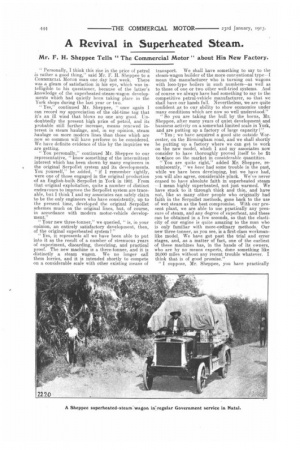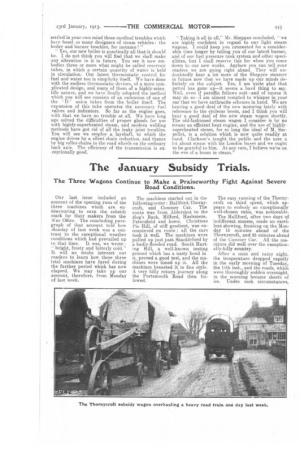A Revival in Superheated Steam.
Page 4

Page 5

If you've noticed an error in this article please click here to report it so we can fix it.
Mr. F. H. Sheppee Tells " The Commercial Motor" about His New Factory.
" Personally, I think this rise in the price of petrol as rather a good thing," said Mr. F. H. Sheppee to a COMMERCIAL MOTOR man one.day last week. There was a gleam of satisfaction in his eye, which was intelligible to his questioner, because of the latter's .knowledge of the superheated-steam-wagon developments which had quietly been taking place in the York shops during the last year or two.
" Yes," continued Mr. Sheppee, " once again I can record my appreciation of the old-time tag that it's an ill wind that blows no one any good. Undoubtedly the present high price of petrol, and its probable still further increase, means renewed interest in steam haulage, and, in my opinion, steam haulage on more modern lines than those which are now so common will have perforce to be considered. We have definite evidence of this by the inquiries we are getting.
"You personally," continued Mr. Sheppee to our representative, "know something of the intermittent interest which has been shown by many engineers in the original Serpollet system and its developments. You yourself," he added., "if I remember rightly, were one of those engaged in the original production of an En,glish-built Serpollet in York in 1902. From that original exploitation, quite a number of distinct endeavours to improve the Serpollet system are traceable, but I think I and my associates can safely claim to be the only engineers who have consistently, up to the present time, developed the original Serpollet schemes much on the original lines, but, of course, in accordance with modern motor-vehicle development."
"Your new three-tonner," we queried, "is, in your opinion, an entirely satisfactory development, then, of the original superheated system ? "
" Yes, it represents all we have been able to put into it as the result of a number of strenuous years of experiment, discarding, theorizing, and practical proof. The new machine is a three-tonner, and it is distinctly a steam wagon. We no longer call them lorries, and it is intended shortly to compete on a considerable scale with other existing means of
transport. We shall have something to say to the steam-wagon builder of the more conventional type—I mean the manufacturer who is turning out wagons with loco-type boilers in such numbers—as well as to those of one or two other well-tried systems. And of course we always have had something to say to the competitive petrol-vehicle manufacturer, so that we shall have our hands full. Nevertheless, we are quite confident as to our ability to show economies under many conditions which are now so well understood."
"So you are taking the bull by the horns, Mr. Sheppee, after many years of quiet development and business activity on a somewhat limited scale in York, and are putting up a factory of large capacity ?"
"Yes ; we have acquired a good site outside Worcester, on the Birmingham road, and we shall shortly be putting up a factory where we can get to work on the new model, which I and my associates now consider to have thoroughly proved itself to be fit to 'place on the market in considerable quantities.
"You are quite right," added Mr. Sheppee, reminiscently, "we have had some trouble in the past, while we have been developing, but we have had, you will also agree, considerable pluck. We've never ceased to have absolute faith in superheated steam —I mean highly superheated, not just warmed. We have stuck to it through thick and thin, and have not, like so many other people who originally had faith in the Serpollet methods, gone back to the use of wet steam as the best compromise. With our present plant, we are able to use practically any pressure of steam, and any degree of superheat, and these can be obtained in a few seconds, so that the elasticity of our engine is quite amazing to the man who is only familiar with more-ordinary methods. Our new three-tonner, as you see, is a first-class workmanlike model. We have got past the trial and error stages, and, as a matter of fact, one of the earliest of these machines has, in the hands of its owners, who are by no means experts, done something like 20,000 miles without any recent trouble whatever. I think that is of good promise."
"1 suppose, Mr. Sheppee, you have practically settled in your own mind those cardinal troubles which have beset so many designers of steam. vehicles : the boiler and burner troubles, for instance ? "
'1 Yes, our new boiler is practically all that it should be. I do not think you will find that we shall make any alteration in it in future. You see it now embodies three or more what might be called reservoir tubes, in which a certain quantity of water is held in circulation. Our latest thermostatic control for fuel and water too is simplicity itself. We have done with the endless thermostatic devices, of a more complicated design, and many of them of a highly-scientific nature, and we have finally adopted the method which you will see consists of an extension of one of
the ' D union tubes from the boiler itself. The expansion of this tube operates the necessary fuel valves and indicators. So far as the engine goes, with that we have no trouble at all. We have long ago solved the difficulties of proper glands for use with highly-superheated steam, and modern welding methods have got rid of all the leaky joint troubles. You will see we employ a, layshaft, to which the engine drives by a silent chain reduction, and thence by big roller chains to the road wheels on the ordinary back axle. The efficiency of the transmission is exceptionally good. " Taking it all in all," Mr. Sheppee concluded, " we are highly confident in regard to. our light steam wagons. I could keep you interested for a considerable time longer by telling you of our latest burner, and of our fuel pressure tank system and other specialities, but I shall reserve this for when you come down to our new works. Anyhow you can tell your readers we are going right ahead. They will undoubtedly hear a lot more of the Sheppee steamer in future now that we have made up our minds definitely on the subject. Yes, I am. quite glad that petrol has gone up—it seems a hard thing to say. Well, even if paraffin follows snit—and of course it may do so—I am almost tempted to whisper in your ear that we have anthracite schemes in hand. We are hearing a good deal of the new motoring lately with reference to the eyclecar boom, and I think you will hear a good deal of the new steam wagon shortly. The old-fashioned steam wagon I consider is by no means an efficient heat engine, and the use of highly
superheated steam, for so long the ideal of M. Serpollet, is a solution which is now quite readily at hand. Clarkson's taught the public and the user a lot about steam with his London buses and we ought to be grateful to him. At any rate, I believe we're on the eve of a boom in steam."






















